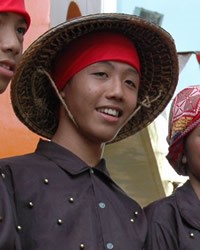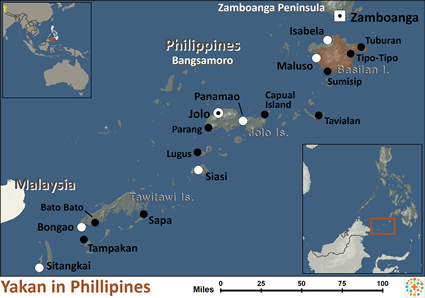Yakan people may be the original inhabitants of Basilan, an island just off the southwestern point of Mindanao Island of the Philippines. They live mostly in the central and southwestern mountainous interior. A small Yakan community also lives on tiny Sacol Island. About one percent of the Yakan people have migrated to the nearby nation of Malaysia.
Yakan people in the Philippines are primarily farmers who use plows drawn by water buffaloes to cultivate the soil. Rice is their main crop; they also grow cassava and coconut. Sadly, few people grow enough rice to last from season to season.
Yakan people live in settlements based on mosque affiliation. The mosque is the center of the Yakan community. Yakan houses are usually scattered among the fields, and it is difficult to see where one settlement ends and the next begins. Inhabitants of a settlement may or may not be of the same clan.
Nuclear families usually live together in rectangular-shaped homes built on stilts. They traditionally built their homes with thatched roofs. Today they use corrugated iron for their roofs. A house usually has only one large room containing no special quarters for the women. A kitchen adjoins the house.
As Muslims, Yakan men may have four wives, but this practice is becoming rare. At one time they arranged all marriages, but now parents must take into consideration the desires of their children. The groom's family still pays a bride price to the bride's family. Newlyweds usually live with the parents of the bride or the groom. Later, they form their own household on land belonging to either of them. The husband or the wife can initiate an end to the marriage, and divorce is common.
The nuclear family, consisting of the husband, his wife, and their unmarried children, is the most common domestic unit. They divide property equally between children, despite teachings in the Koran, which state that a daughter should only inherit half as much as a son.
Yakan people in the Philippines enjoy playing musical instruments. They play flutes, Jew's harps and percussion instruments at births, weddings and funerals. They play music for the growing rice, hoping to "make it happy." Yakan people believe this will help them have a bountiful harvest.
Yakan people are primarily farmers using plows drawn by water buffaloes to cultivate the soil. Sadly, few people grow enough rice to last from season to season.
The Yakan people are solidly Muslim, and they have been since Muslim traders brought this monotheistic religion to the southern Philippines in the 13th century. The imam is the religious leader of the community, and he conducts various Muslim ceremonies. They follow the Islamic calendar and celebrate the annual Muslim feasts, such as the birthday of Mohammed. The Yakans hold ceremonies in connection with births, completion of Koranic studies, weddings, and burials.
These Muslims depend upon good works to pay the penalty for their sins. They depend upon the spirit world for their daily needs because they regard Allah as too distant. The Yakan people believe Allah may determine their eternal salvation, but the spirits determine how well they live in their daily lives. They must appease the spirits. They often use charms and amulets to help them deal with spiritual forces.
The primary need of Yakan people in the Philippines is to be liberated from traditions that hinder them from receiving the Savior who died in their place. They need to receive believers into their community. There are audio, visual and written Christian resources in the Yakan language. Someone must earn the trust of these people to introduce them to Christ's vital truth.
Pray for Yakan people in the Philippines to have open and receptive hearts, and that they would encounter the King of kings.
Pray that movements to Christ would explode, as followers make followers, and that they would place their identity in Christ.
Ask God to raise up prayer teams who will begin breaking up the spiritual soil through worship and intercession.
Ask the Lord to bring forth a vigorous Yakan church for the glory of his name!
Scripture Prayers for the Yakan in Philippines.
| Profile Source: Joshua Project |

























